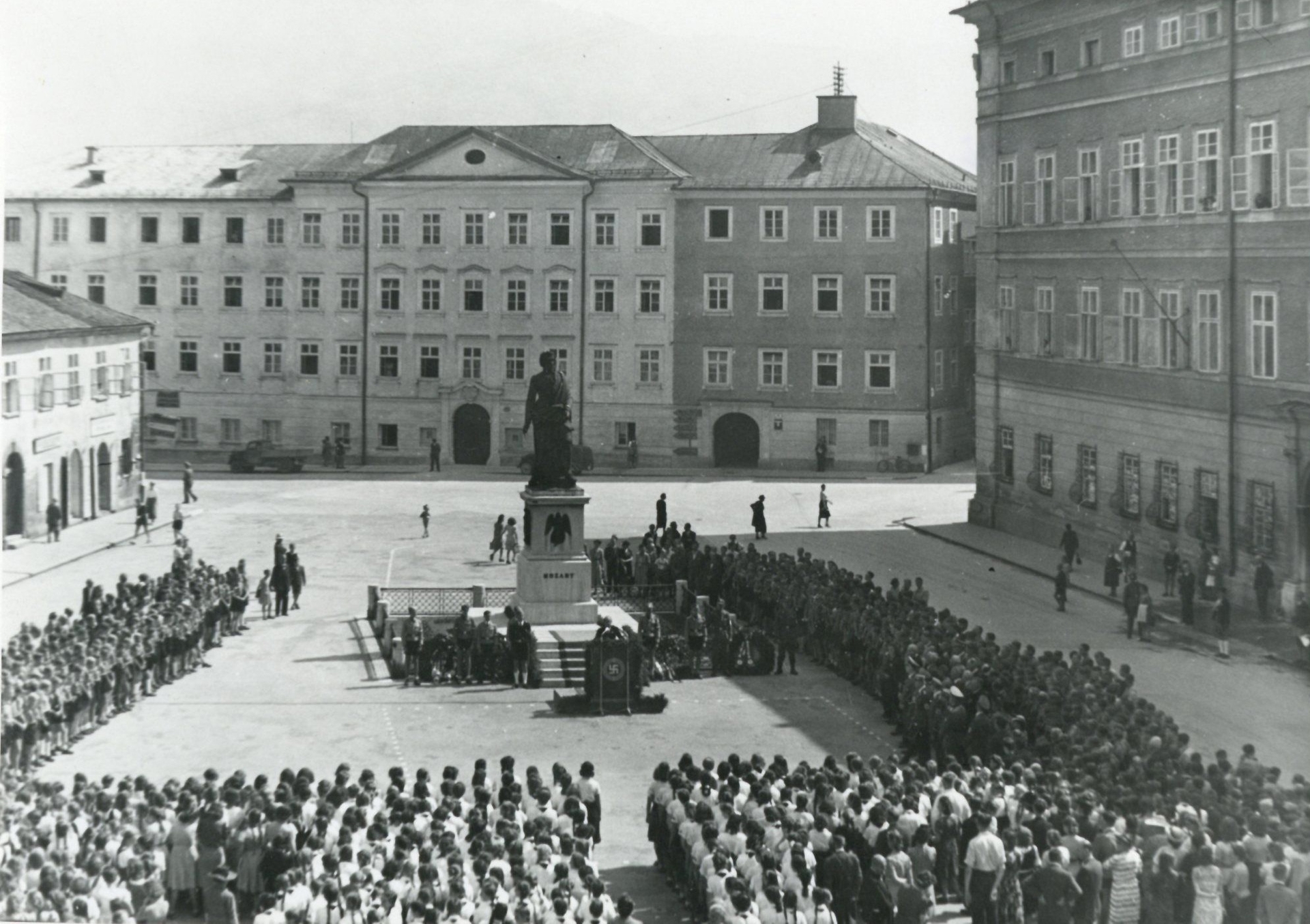The International Mozarteum Foundation and National Socialism
A Salzburg cultural institution explores its role in National Socialism: The International Mozarteum Foundation Salzburg, under the scientific direction of Univ.-Prof. Mag. DDr. Oliver Rathkolb (Vienna) and Priv.-Doz. Dr. Alexander Pinwinkler (Vienna/Salzburg), has dealt with this difficult part of its history in a research project lasting several years. In the process, more than 16,000 pages of documents from their own and external holdings were evaluated. The results are now available in book form.
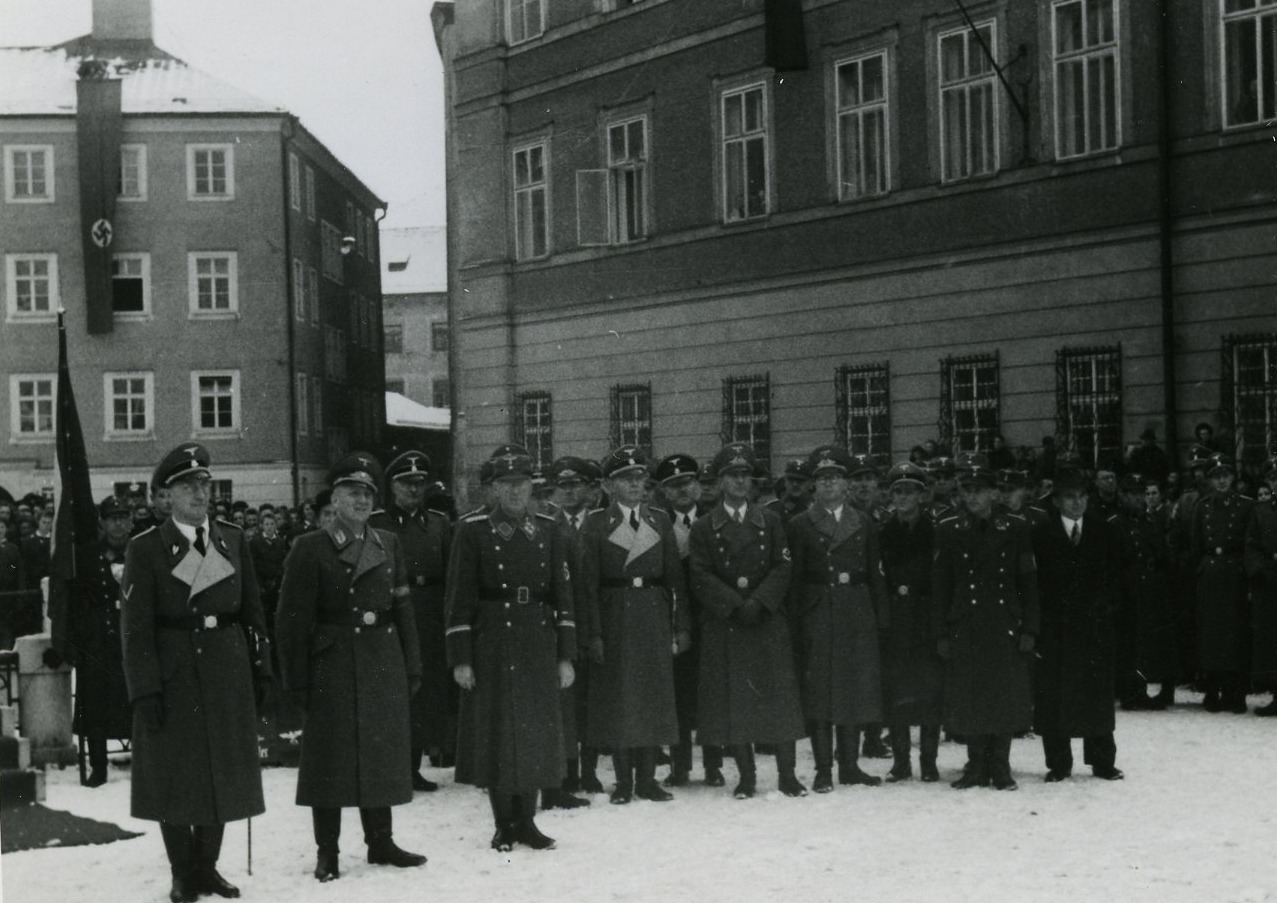
One of Salzburg’s cultural institutions examines its role under National Socialism. Following the annexation of Austria by National Socialist Germany in 1938, the National Socialist regime appointed the regional governor of the State of Salzburg, Albert Reitter, as president of the International Mozarteum Foundation. The Foundation was required to remove the word “International” from its name and organize itself along authoritarian lines – historians use the term Führerprinzip to describe this fundamental basis of political authority according to which the respective leader’s word was law. Reitter demanded that the Foundation play a particular role in National Socialist cultural politics, a role that was to resonate far beyond Salzburg itself. Attempts were made to acquire Mozartian memorabilia for the Foundation, and the celebrations that were held in 1941 to mark the centenary of its establishment were used to rebrand Mozart for the benefit of a war-time audience as a hero of “Aryan Germanness”.
The International Mozarteum Foundation had emerged from the Cathedral Music Society and Mozarteum that had been established in 1841. For the last 140 years it has seen itself as the world’s leading cultural institution that serves to cultivate Mozart’s legacy. Under the scholarly guidance of Professor Oliver Rathkolb and Dr Alexander Pinwinkler (Vienna and Salzburg), it has spent many years researching this difficult period in its past. During the course of the project more than 16,000 pages of documents have been examined from its own holdings and from those of other institutions. The results of this research are now available in the form of a book.
Published by Anton Pustet Verlag, Die Internationale Stiftung Mozarteum und der Nationalsozialismus. Politische Einflüsse auf Organisation, Mozart-Forschung, Museum und Bibliothek documents the National Socialists’ deluded belief that such goals are feasible and analyses the background to the fact that the Foundation’s protagonists and employees were very willing to conform to National Socialist ideology during the years of the National Socialists’ terrorist regime.
About the book
The International Mozarteum Foundation can look back on a long tradition (beginning in the 19th century) of cultivating Mozart’s legacy in Salzburg, a tradition which has always been closely connected to its activities. In portrayals of the Foundation’s history, the period of National Socialism has hitherto been marginalized as a mere episode, imposed from the outside, that had little impact on the Foundation’s otherwise continuous commitment to its aim of fostering Mozart’s legacy. It is now clear that not only was the Foundation not run along “provisional” lines following Germany’s “annexation (Anschluss) of Austria in 1938, but the myth that it was once again “business as usual” soon after the war was over in no way does justice to the difficulties that the Foundation faced in starting afresh in the early post-war period. The continuities and discontinuities at the Foundation in terms of staffing, ideology and mental outlook during the years from 1938 to 1945 pose a highly complex subject for research.
When the National Socialists seized power in Austria on 12 March 1938, it was initially unclear what effect this political upheaval would have on the future direction of the Foundation. The by-laws of the Salzburg association were quickly adapted along authoritarian lines – historians use the term Führerprinzip to describe this fundamental basis of political authority according to which the respective leader’s word was law. An anti-Semitic Aryan paragraph was added to the by-laws, and the word “International” was eliminated from the association’s name. The powers of the Mozarttag, the decision-making body of the Internationale Stiftung Mozarteum according to its statutes, were massively reduced, and the Kuratorium [board of trustees/advisory board] was dissolved. After the dismissal of Franz Schneiderhan, who had served as President from 1935 to 1938, the Salzburg lawyer and newly-installed National Socialist Landesstatthalter Dr. Albert Reitter also assumed presidency of the Stiftung Mozarteum. Reitter was finally replaced by Dr. Oskar Grazer in March 1945.
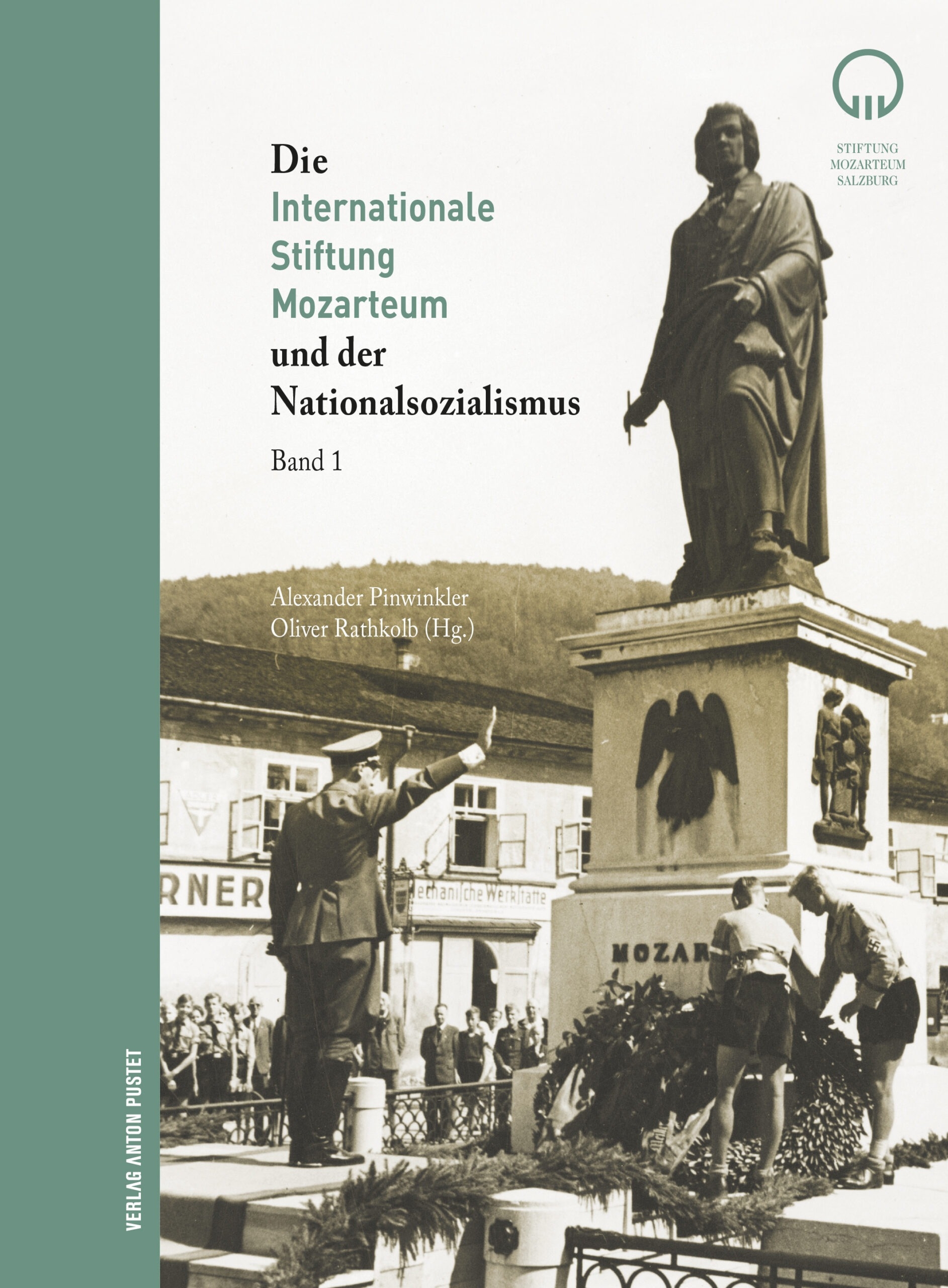
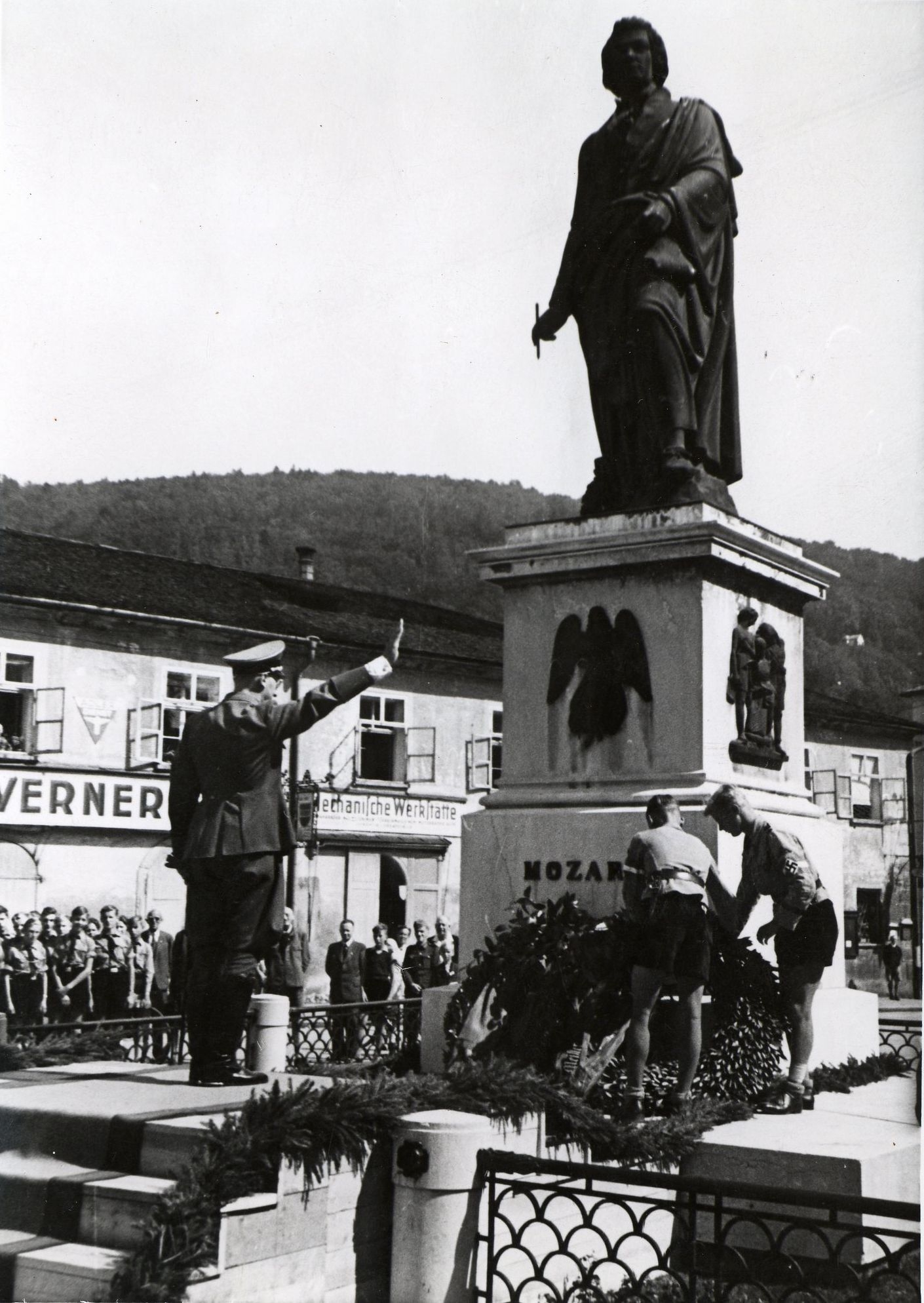
As soon as the crisis surrounding the Anschluss and suspension of the organizational activities of societies and associations had been overcome, the Mozarteum Foundation emerged as a suitable instrument that could be used to further the National Socialists’ cultural policies. The institution itself and the officials appointed by the National Socialist authorities actively sought to exploit the cultural and political situation resulting from the conditions imposed upon them by the Third Reich. Responsible for the implementation of these plans was Dr. Erich Valentin, who was brought to Salzburg from Munich in the spring of 1939 and initially worked as librarian at the Mozarteum Foundation. As secretary–general, Valentin was responsible for the management and scholarly agendas of the Foundation from June 1939 to March 1944; in 1944, he was replaced by Rudolf Schmidt-Oemler.
The Mozart commemorative year 1941 occupies a key position: on Valentinʼs initiative, the Mozarteum Foundation succeeded in establishing in Salzburg a prestigious edition of the Complete Works of Mozart, generously endowed by the Führer, Adolf Hitler. The Neues Mozart Jahrbuch, published for the first time that year, became a platform for Mozart research. The Zentralinstitut für Mozartforschung [Central Institute for Mozart Research], an association of Mozart researchers from Germany and abroad, played an important role in these plans. The central institute had been conceived as early as 1931 at the suggestion of Erich Schenk, but was only gradually implemented from 1936 onwards. Through active participation in exhibitions under the unsalaried museum director Otto Kunz, the Mozarteum Foundation was recognized far beyond the borders of Salzburg. However, the ambitious research tasks were undertaken only half-heartedly, and ultimately without lasting success. This failure can be attributed only partly to the rapidly deteriorating conditions for scholarly work during World War II.
(Photo: Albert Reitter at the ceremony of the 100 year anniversary at the Mozart statue, © ISM-Archiv)
The role played by the Foundation’s leading officials in the discrimination against and expropriation of opponents of National Socialism has proved extremely problematic. Through the Mozartwerk, the Foundation was actively involved in German cultural propaganda in occupied territories. The confiscated music collections of the monasteries of St. Peter and Michaelbeuern were assigned to the Foundation’s library. Various attempts by Valentin to incorporate Mozart autographs from private and public collections into the library with governmental help are documented. Although Valentin did not shy away from deliberate denunciations, these attempts ultimately failed, primarily because the Foundation, as a private association, was not taken into account when the government distributed looted property.
With the essay collection Die Internationale Stiftung Mozarteum und der Nationalsozialismus. Politische Einflüsse auf Organisation, Mozart-Forschung, Museen und Bibliothek, edited by Alexander Pinwinkler and Oliver Rathkolb (Verlag Anton Pustet, Salzburg 2022), the International Mozarteum Foundation has taken a first step towards a critical and scholarly assessment of its past during the National Socialist era. Individual studies focus on the Nazi period but also cover the earlier and later years.
(Foto: Speech of “Gauleiter” Gustav Adolf Scheel at the 150th anniversary of Mozart’s death 1941, © ISM-Archiv)
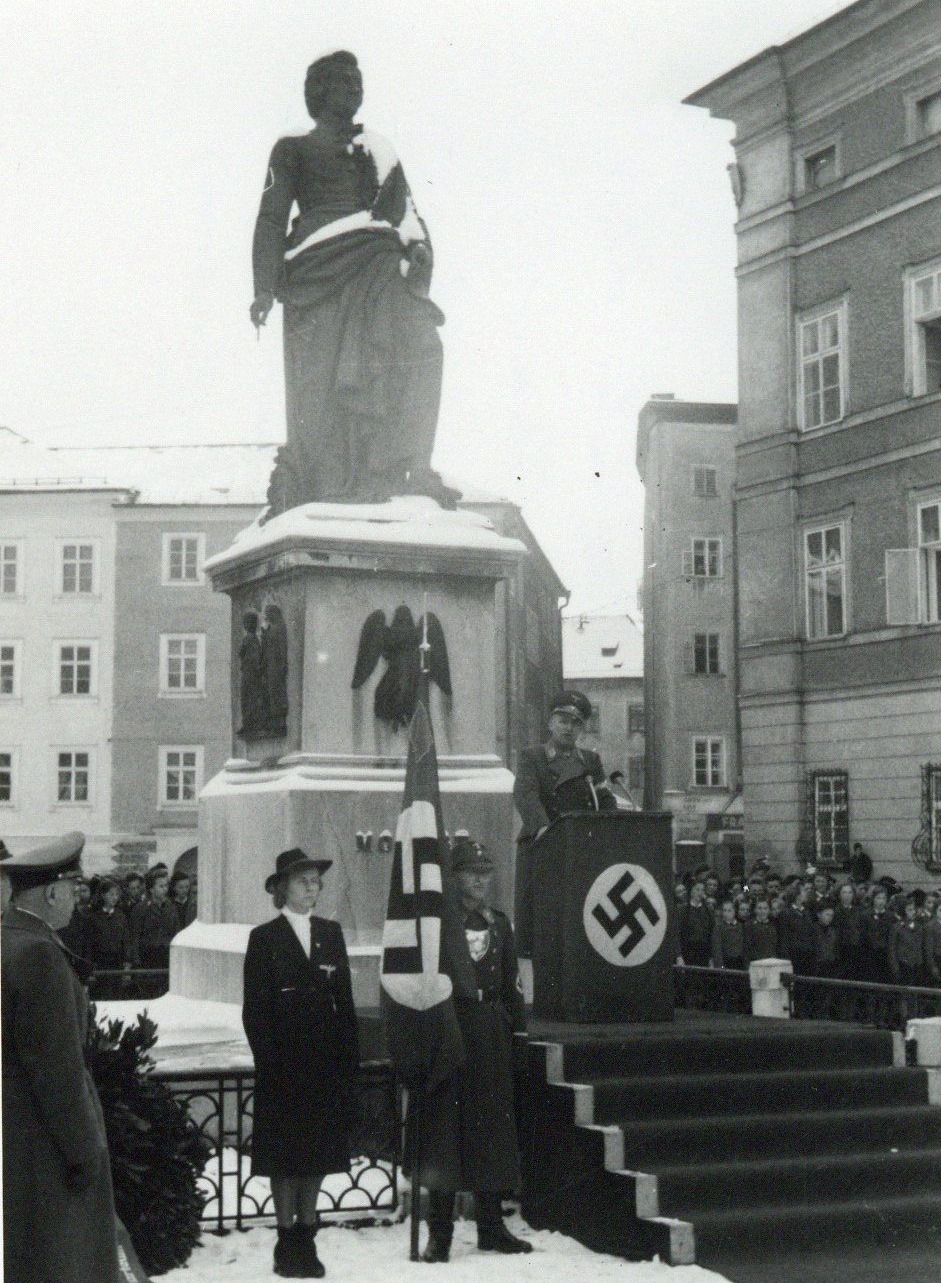
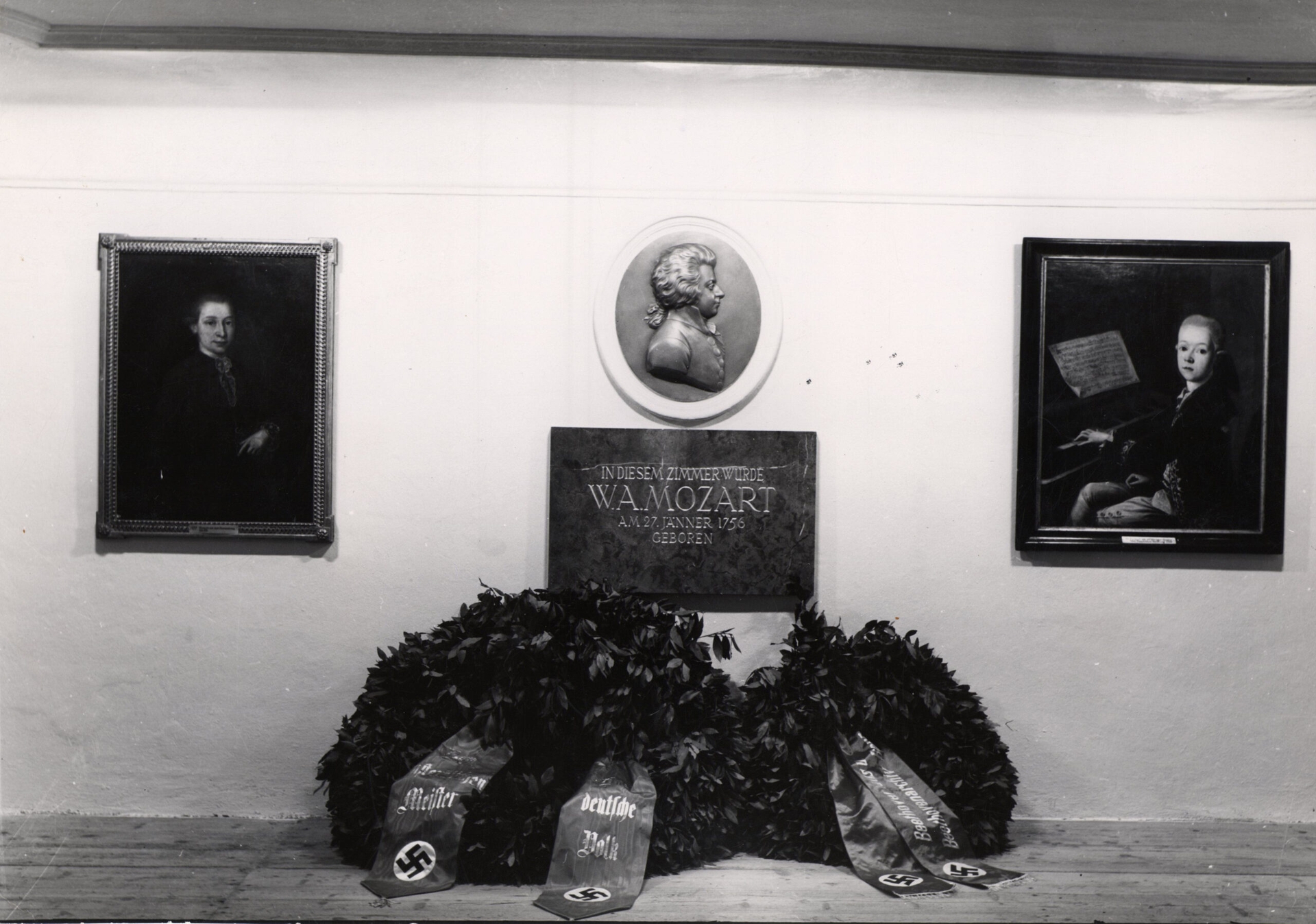
After 1945, the increased importance of the Mozarteum Foundation in the Third Reich – which essentially went hand in hand with the political propagation of Mozart and his music as allegedly genuinely “German” and “Aryan” – contrasted sharply with attempts by those responsible at the Foundation to downplay as far as possible their own role during the previous years . In fact, however, the politicization of the leading figures in the Foundation (particularly Albert Reitter, Erich Valentin and Oskar Grazer) and their involvement with state institutions and those in power were probably stronger during the Third Reich than they ever were before or afterwards.
Although important and well-founded results have now been presented with this anthology, research of the Nazi period as part of its history is by no means completed for the International Mozarteum Foundation. Important topics for further research are the politically motivated role of musical performances and international networks for activities during the Nazi era. The years before and after the Anschluss must also be researched more closely in order to establish the necessary context. Furthermore, the relationships and lines of demarcation with the former music school of the Mozarteum (originally part of the Foundation, later under state control and elevated to the status of “Reichshochschule Mozarteum” in 1941) must be examined more closely.
(Foto: Mozart’s birth room with a wreath of educational minister Bernhard Rust of June 14th, 1939. © ISM-Archiv)
The Salzburg International Mozarteum Foundation is aware of its historical responsibility. The Executive Committee (Präsidium), Board of Trustees (Kuratorium), and the Mozarttag have already unanimously decided to voluntarily apply federal regulations regarding the restitution of looted cultural property. For example, individual items discovered only recently through intensive research will be returned to the Archabbey of St. Peter, and an agreement is on its way with the Katholische Hochschulgemeinde as the legal successor of the Katholische Universitätsverein, which had been dissolved during the Nazi era. In any event, provenance research already begun with the aim of restoring unlawfully incorporated material will be systematically continued.
These new research results have also raised a burning questionfor the International Mozarteum Foundation, which will now devote special attention to the topic. It is a question of honours for people who held important positions during the Nazi regime and who were deeply involved in National Socialist thought and action. The Foundation will nowdevelop a catalogue of criteria for the revocation of honours and awards, and will then make decisions as necessary.
(Foto: Speeck Erich Valentin at the 100 year aniversary of the Mozart statue on September 4, 1942. © ISM-Archiv)
